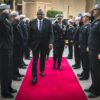
Abroad and at home, ideology ruled the U.S.
Patrick Lawrence writes that Joe Biden, a.k.a. “the Big Guy,” will be formally investigated on accumulating evidence he participated and benefited from his son Hunter’s years of manifestly criminal conniving.